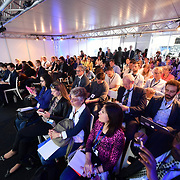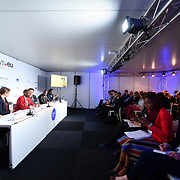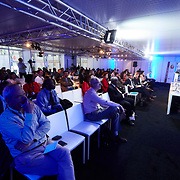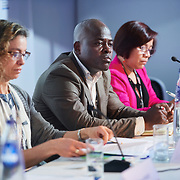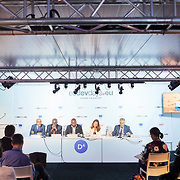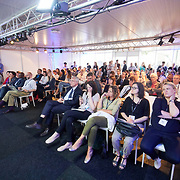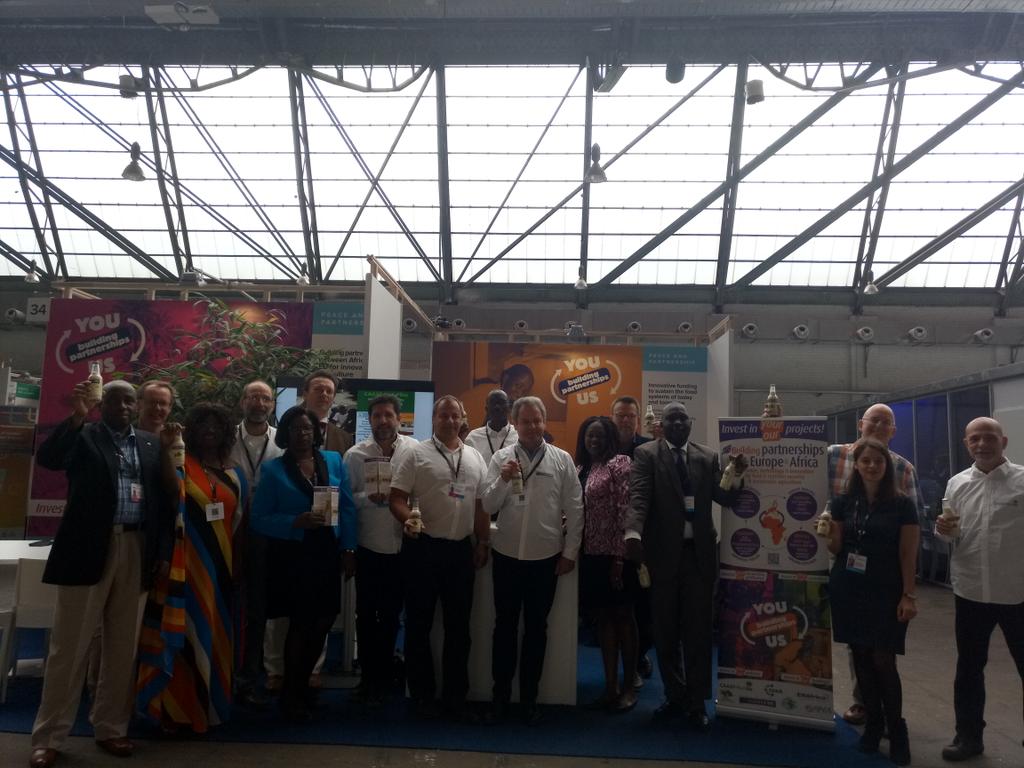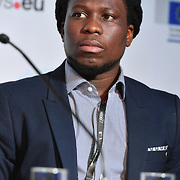 |
| Thato Mojaboswa Stimela mAgri/Botswana Managing Director Brastorne Enterprises |
In Botswana, an entrepreneur with information technology skills has created an application (mAgri) that farmers can access through their mobile phones. Since the Internet is currently too expensive for most people, the application uses Short Message Service (SMS) and Unstructured Supplementary Service Data (USSD) technology. Users pay a small fee, and state their name, location and type of crop they are producing and then receive local advice about weather and soil conditions.
The entrepreneur has increased the number of users from 2,000 to 250,000, with about 500 new ones signing up each day. A major factor in this success is that his application has a social element, allowing users to “chat” with each other, and access Wikipedia and their emails. The target is 500,000 users and to add more services, including insurance, crop protection and weather updates, to make the application available on the internet as data processing costs decline, and to expand the service to other countries.
AgriHack Talent is a programme of the Technical Centre for Agricultural and Rural Cooperation (CTA). It supports ICT innovations and entrepreneurship in Agriculture led by young entrepreneurs. Pitch AgriHack is an e-agriculture start-up competition, a component of the program. The pilot edition of Pitch AgriHack was held in 2016 in collaboration with the African Development Bank; its final was in Kenya.
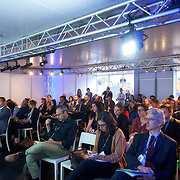 How to create decent jobs in the global supply chains?
How to create decent jobs in the global supply chains?
Organised by: EC, ILO, UNIDO, ACP
DG DEVCO shared its experience in promoting decent work in global value chains, particularly in the garment sector. A dialogue unfolded involving the African, Caribbean and Pacific Secretariat and the participants.
How to make agriculture attractive for youth?
Organised by: ColeACP, YPARD, Gembloux Agro Bio-Tech, Global Vert, ACP Young Professionals Network
Innovative agriculture for next generation farms
Organised by: OCP, EU-Africa Business Forum
Participants heard about two examples of how high technology can be used to boost the productivity of African agriculture. The Nigerian company Zenvus has developed technology that allows farmers to monitor their crops and land more efficiently, registering the state of the soil or the threat from pests, telling them when to irrigate or when to use fertiliser. The technology can make it easier for farmers to raise credit with banks, something that can be difficult because credit institutions have an independent means of verifying the information that farmers provide.
Panellists agreed that decisions on technological change must always involve local communities and cannot be imposed from outside. Technology must always work to the benefit of the farmer. The solutions to Africa’s development issues will not be decided in Paris, London, Washington or Geneva: They can only be taken in Africa by Africans.
Young people are attracted by technology and technological innovation could be a means to draw young people to agriculture, or to keep them from leaving the farm, which would help ease Africa’s unemployment problem.
 The central role of water for inclusive and sustainable growth and the creation of decent jobs
The central role of water for inclusive and sustainable growth and the creation of decent jobs
Organised by: UNESCO, World Water Assessment Programme, EC
The potential employment effects of investment in water are considerable. Water treatment plants, for example, directly employ engineers, administrative staff, security guards and indirectly, many more. Crucially are the induced and growth-related jobs in the wider economy that are made possible by investment in water. In Kinshasa, small water systems operated by local communities have created 400 local sustainable jobs.
In Africa, it is estimated that women and girls spend the equivalent of one year’s worth of work by France’s entire workforce on collecting water every year. However, in the current programming cycle and following the end of the EU’s Water Facility, fewer than 10 countries in Africa have designated water as a focal sector, which reduces opportunities for obtaining funds for blending under the African Investment Facility.
Business switch to green with innovative support services
Organised by: UNEP, UNIDO, SwithAfrica, Regional Activity Centre for Sustainable Consumption and Production
The session addressed the transition to an inclusive green economy as a new model of development, that can be based on the circular economy paradigm. It builds on the experience of the SWITCH programmes in Asia, Africa and the Mediterranean region, in developing partnerships with the private sector to shift SME’s behaviour and practice, towards Sustainable Production and Consumption patterns. The lab generated a debate on private sector collaboration approaches – ranging from enabling eco-entrepreneurship to providing MSMEs with technical assistance on SCP and to enhancing sustainable value chains – and how these can become more effective in the context of the inclusive green economy transition.
| Prof De Decker, KULeuven |
Sustainable soil management: the foundation for Africa’s future?
Organised by: EC, KULeuven, WAC, FAO,
Soil is at the heart of agriculture. Africa’s fertile soils are under threat, especially due to climate change and poor land management. Nutrient and soil organic matter depletion, together with soil erosion, worsen the effect of climate change and decrease the resilience of the land. The answer lies in the large-scale adoption, both at policy and practical levels, of guidelines for sustainable soil management, including integrated soil fertility management, in conjunction with climate-safe agriculture, for example, intercropping and agroforestry. The session assessed systematic challenges and obstacles for ensuring food security and rural development, and providing increased resilience to climate change.
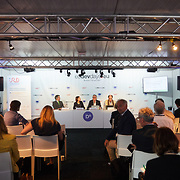 Soils and agriculture in the face of climate change: Challenges of the 4P1000 initiative
Soils and agriculture in the face of climate change: Challenges of the 4P1000 initiativeA related African initiative to improve soil yields and support local farmers is bearing fruit in Burkina Faso. The Association for Training and Research in Agro-Ecology is working with farmers, local NGOs and agricultural researchers to develop agro-ecological farming practices that restore the soil’s fertility and increase food production. Farmers build on traditional practices to conserve water and improve the soil. In addition, they use animal and other organic compost to enrich the soil, carry out strategic tree planting, and develop short-cycle seeds.
The programme helps farmers to experiment in comparing costs and benefits in relation to other practices, as well as offering technical training sessions in agro-ecology innovation. It also has a social aspect: boosting gender and economic equity by setting up women’s savings and credit groups; encouraging dry-season vegetable gardening for consumption and sale at local markets; improving practices for raising livestock; and building agricultural capacity.
Global Climate Change Alliance plus (GCCA+): The role of CSOs supporting climate change and sustainable development agenda
Organised by EC
The systemic inclusion of CSOs in climate policy-making is a step towards inclusive risk governance, the area where climate resilience, disaster resilience, and conflict resilience overlap. This interconnectedness is especially salient at local level, where communities are faced with interlocking resilience challenges. CSOs have a crucial role to play in integrating disaster risk reduction and resilience-building in climate adaptation strategies. Local communities become even more vulnerable when they are excluded from the policy process.
Global partnerships supporting smallholder farmers
Organised by: CABI, EC, East-West Seed
Companies can provide tropical vegetable seeds, which cost about 5 % of farm costs, but can more than double or treble income. Alternatively, with the growth of smartphones and tablets, farmers can send pictures of diseased crops to remote “plant doctors”, with a 92 % success rate in diagnosis. Early warning of a particular banana pest, for example, can be transmitted to 50 million smallholder farmers at the touch of a button.
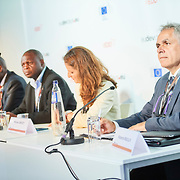 But just as donors are not just cash machines, farmers are not just guinea pigs for trial experiments. It is a dignified role – the foundation of all human life – but remote rural farmers often need education to help articulate their needs and eradicate pockets of ignorance. For example, in some developing countries, a farmer is not considered ‘a man’ unless he grows maize – even though it requires heavy rainfall and maize is often not as profitable as other crops, such as cashew nuts.
But just as donors are not just cash machines, farmers are not just guinea pigs for trial experiments. It is a dignified role – the foundation of all human life – but remote rural farmers often need education to help articulate their needs and eradicate pockets of ignorance. For example, in some developing countries, a farmer is not considered ‘a man’ unless he grows maize – even though it requires heavy rainfall and maize is often not as profitable as other crops, such as cashew nuts. For any PPP to be successful, its entry point must be the local village and its success must start at the farm gate. That means increasing productivity and access to markets, which in turn build up income and resilience – a virtuous circle where a farmer can then afford more seeds or technology. There is no one-size-fits-all solution for PPPs – different regional fruits, vegetables, tastes and specialities – but farmer cooperatives can help smallholders when dealing with the private sector. Farmer cooperatives can also help to scale up enterprises in what will always be a largely private sector activity, whether large or small.
For any PPP to be successful, its entry point must be the local village and its success must start at the farm gate. That means increasing productivity and access to markets, which in turn build up income and resilience – a virtuous circle where a farmer can then afford more seeds or technology. There is no one-size-fits-all solution for PPPs – different regional fruits, vegetables, tastes and specialities – but farmer cooperatives can help smallholders when dealing with the private sector. Farmer cooperatives can also help to scale up enterprises in what will always be a largely private sector activity, whether large or small.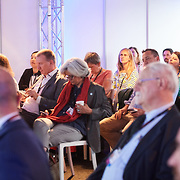 A Territorial Approach to Food Security and Nutrition Policy
A Territorial Approach to Food Security and Nutrition Policy
Organised by: EC, OECD, German Cooperation
Gathering knowledge, with governments in Cambodia, Colombia, Côte d’Ivoire, Mali, Niger, Morocco, and Peru, a joint study by the FAO, the OECD, and the United Nations Capital Development Fund, has confirmed the value added that traditional approaches have when complemented with a territorial approach to address food insecurity. This approach promotes bottom-up, place-based and multisectoral development initiatives, which can break through dependency relationships and improve the enabling factors for development, capitalising on the benefits of urban-rural linkages. This session presented the findings from the joint study and outline the next steps of the project.
Organised by: EC, European Investment Bank, European Development Investment Institutions

 |
| Roberto Ridolfi Director for Sustainable Growth and Development European Commission – DG for International Cooperation and Development |
The main blockage to investment is frequently not the availability of finance but the local business environment. Since the Lisbon Treaty, the EU has been in a unique position in that it can launch a political dialogue with a partner government about issues such as the rule of law, an instrument that no development bank has at its disposal. These dialogues are a forum to address the main constraints to investment and to promote good governance. In addition to transparent regulation, private sector actors also require security and safety to operate, and hard and soft infrastructure, from transport and energy to health and education.
This is why the EU’s External Investment Plan (EIP), adopted in September 2016, operates as a three-pillar structure: the European Fund for Sustainable Development; technical assistance to develop financially attractive projects; and the promotion of a conducive investment climate. The EIP is expected to leverage €44 billion to €50 billion in investment with €3.5 billion in grants. Guarantees from the European Fund for Sustainable Development serve to reduce the risk for private investors and absorb potential losses. The EIP is currently focused on Africa and the European neighbourhood but could include other regions in the future.
 |
| Michael Hailu (CTA), Patrice Sewade (Sojagnon), Dr Kanayo F. Nwanze (former IFAD president), Yemi Aknibamijo (FARA ED) |
Driving sustainable development through export-oriented agriculture
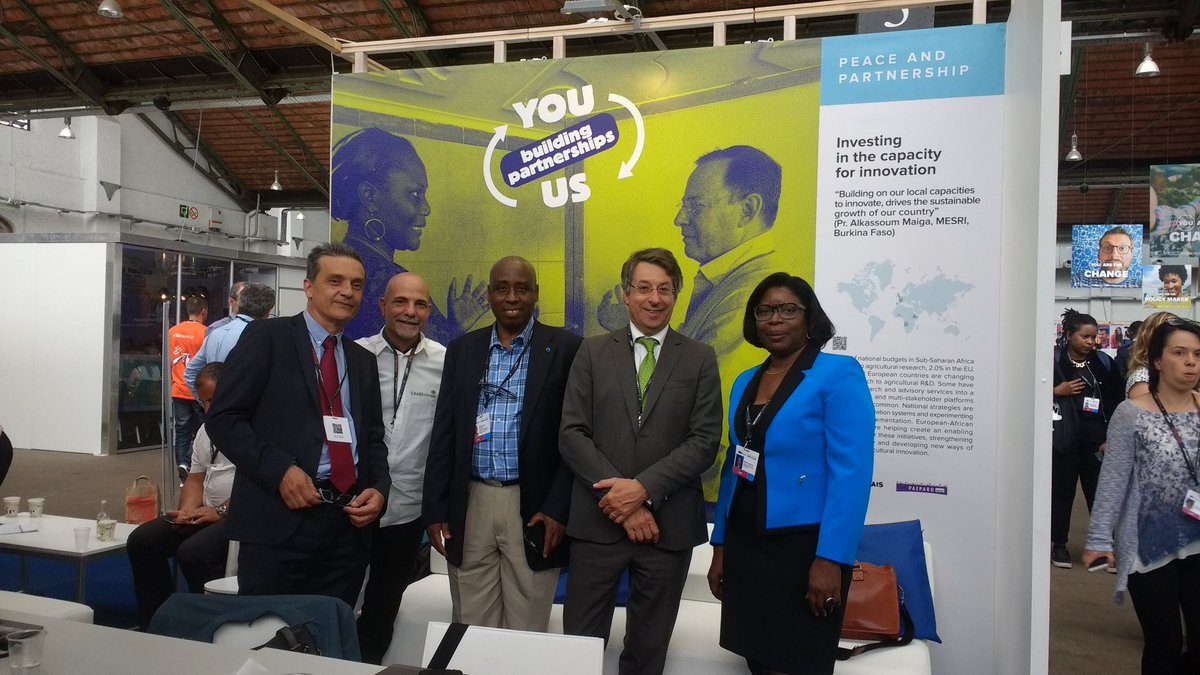 |
| Bernard Rey (DevCo) said innovation is key for agriculture to fulfill the development objectives, like climate change and nutrition |
Reinforcing Africa-EU research and innovation collaboration for development impact
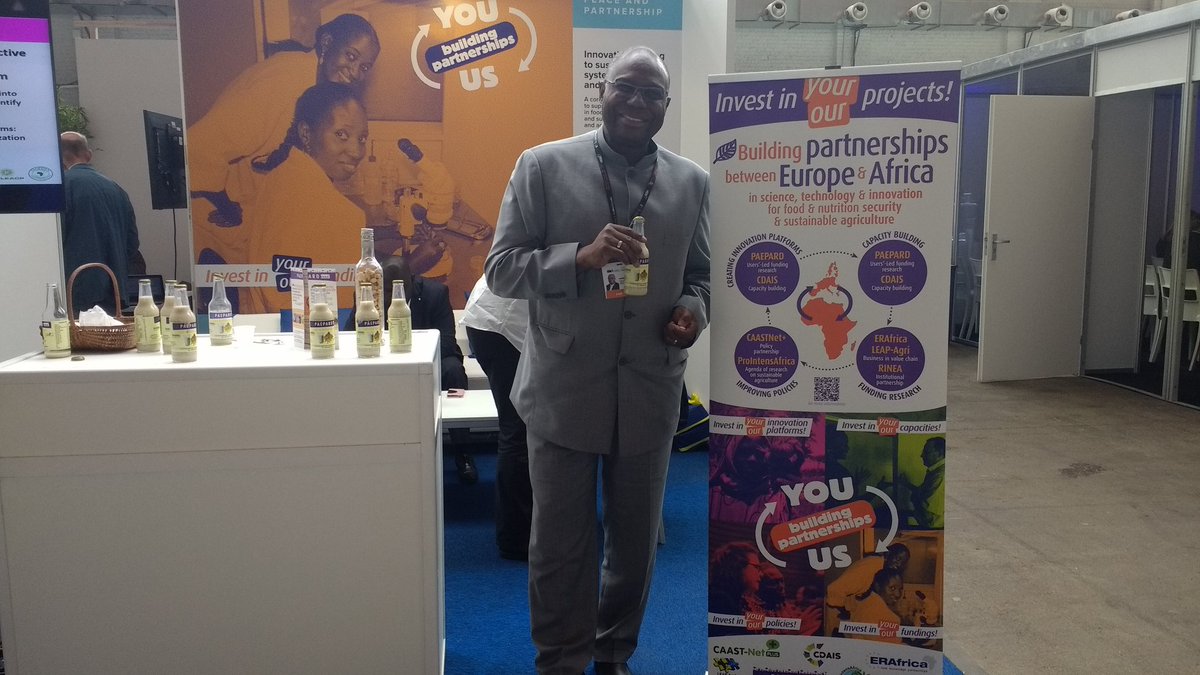 |
| Executive Director, FARA said: Showcasing PAEPARD, the best ship in Africa-EU research and innovation partnerships |
Delivering agricultural knowledge to empower youth and women
Stand 73: ColeACP, YPARD, Gembloux Agro Bio-Tech, CEJA, Global Vert, ACP Young Professionals Network
Source: PAEPARD FEED
by secretary
by secretary
by secretary
by secretary
by secretary
by secretary
by secretary
by secretary
by secretary
by secretary
by secretary
by secretary
by secretary
by secretary
by secretary
by secretary
by secretary
by secretary
by secretary
by secretary
by secretary
by secretary
by secretary
by secretary
by secretary
by secretary
by secretary
by secretary
by secretary
by secretary
by secretary
by secretary
by secretary
by secretary
by secretary
by secretary
by secretary
by secretary
by secretary
by secretary
by secretary
by secretary
by secretary
by secretary
by secretary
by secretary
by secretary
by secretary
by secretary
by secretary
by secretary
by secretary
by secretary
by secretary
by secretary
by secretary
by secretary
by secretary
by secretary
by secretary
by secretary
by secretary
by secretary
by secretary
by secretary
by secretary
by secretary
by secretary
by secretary
by secretary
by secretary
by secretary
by secretary
by secretary
by secretary
by secretary
by secretary
by secretary
by secretary
by secretary
by secretary
by secretary
by secretary
by secretary
by secretary
by secretary
by secretary
by secretary
by secretary
by secretary
by secretary
by secretary
by secretary
by secretary
by secretary
by secretary
by secretary
by secretary
by secretary
by secretary
by secretary
by secretary
by secretary
by secretary
by secretary
by secretary
by secretary
by secretary
by secretary
by secretary
by secretary
by secretary
by secretary
by secretary
by secretary
by secretary
by secretary
by secretary
by secretary
by secretary
by secretary
by secretary
by secretary
by secretary
by secretary
by secretary
by secretary
by secretary
by secretary
by secretary
by secretary
by secretary
by secretary
by secretary
by secretary
by secretary
by secretary
by secretary
by secretary
by secretary
by secretary
by secretary
by secretary
by secretary
by secretary
by secretary
by secretary
by secretary
by secretary
by secretary
by secretary
by secretary
by secretary
by secretary
by secretary
by secretary
by secretary
by secretary
by secretary
by secretary
by secretary
by secretary
by secretary
by secretary
by secretary
by secretary
by secretary
by secretary
by secretary
by secretary
by secretary
by secretary
by secretary
by secretary
by secretary
by secretary
by secretary
by secretary
by secretary
by secretary
by secretary
by secretary
by secretary
by secretary
by secretary
by secretary
by secretary
by secretary
by secretary
by secretary
by secretary
by secretary
by secretary
by secretary
by secretary
by secretary
by secretary
by secretary
by secretary
by secretary
by secretary
by secretary
by secretary
by secretary
by secretary
by secretary
by secretary
by secretary
by secretary
by secretary
by secretary
by secretary
by secretary
by secretary
by secretary
by secretary
by secretary
by secretary
by secretary
by secretary
by secretary
by secretary
by secretary
by secretary
by secretary
by secretary
by secretary
by secretary
by secretary
by secretary
by secretary
by secretary
by secretary
by secretary
by secretary
by secretary
by secretary
by secretary
by secretary
by secretary
by secretary
by secretary
by secretary
by secretary
by secretary
by secretary
by secretary
by secretary
by secretary
by secretary
by secretary
by secretary
by secretary
by secretary
by secretary
by secretary
by secretary
by secretary
by secretary
by secretary
by secretary
by secretary
by secretary
by secretary
by secretary
by secretary
by secretary
by secretary
by secretary
by secretary
by secretary
by secretary
by secretary
by secretary
by secretary
by secretary
by secretary
by secretary
by secretary
by secretary
by secretary
by secretary
by secretary
by secretary
by secretary
by secretary
by secretary
by secretary
by secretary
by secretary
by secretary
by secretary
by secretary
by secretary
by secretary
by secretary
by secretary
by secretary
by secretary
by secretary
by secretary
by secretary
by secretary
by secretary
by secretary
by secretary
by secretary
by secretary
by secretary
by secretary
by secretary
by secretary
by secretary
by secretary
by secretary
by secretary
by secretary
by secretary
by secretary
by secretary
by secretary
by secretary
by secretary
by secretary
by secretary
by secretary
by secretary
by secretary
by secretary
by secretary
by secretary
by secretary
by secretary
by secretary
by secretary
by secretary
by secretary
by secretary
by secretary
by secretary
by secretary
by secretary
by secretary
by secretary
by secretary
by secretary
by secretary
by secretary
by secretary
by secretary
by secretary
by secretary
by secretary
by secretary
by secretary
by secretary
by secretary
by secretary
by secretary
by secretary
by secretary
by secretary
by secretary
by secretary
by secretary
by secretary
by secretary
by secretary
by secretary
by secretary
by secretary
by secretary
by secretary
by secretary
by secretary
by secretary
by secretary
by secretary
by secretary
by secretary
by secretary
by secretary
by secretary
by secretary
by secretary
by secretary
by secretary
by secretary
by secretary
by secretary
by secretary
by secretary
by secretary
by secretary
by secretary
by secretary
by secretary
by secretary
by secretary
by secretary
by secretary
by secretary
by secretary
by secretary
by secretary
by secretary
by secretary
by secretary
by secretary
by secretary
by secretary
by secretary
by secretary
by secretary
by secretary
by secretary
by secretary
by secretary
by secretary
by secretary
by secretary
by secretary
by secretary
by secretary
by secretary
by secretary
by secretary
by secretary
by secretary
by secretary
by secretary
by secretary
by secretary
by secretary
by secretary
by secretary
by secretary
by secretary
by secretary
by secretary
by secretary
by secretary
by secretary
by secretary
by secretary
by secretary
by secretary
by secretary
by secretary
by secretary
by secretary
by secretary
by secretary
by secretary
by secretary
by secretary
by secretary
by secretary
by secretary
by secretary
by secretary
by secretary
by secretary
by secretary
by secretary
by secretary
by secretary
by secretary
by secretary
by secretary
by secretary
by secretary
by secretary
by secretary
by secretary
by secretary
by secretary
by secretary
by secretary
by secretary
by secretary
by secretary
by secretary
by secretary
by secretary
by secretary
by secretary
by secretary
by secretary
by secretary
by secretary
by secretary
by secretary
by secretary
by secretary
by secretary
by secretary
by secretary
by secretary
by secretary
by secretary
by secretary
by secretary
by secretary
by secretary
by secretary
by secretary
by secretary
by secretary
by secretary
by secretary
by secretary
by secretary
by secretary
by secretary
by secretary
by secretary
by secretary
by secretary
by secretary
by secretary
by secretary
by secretary
by secretary
by secretary
by secretary
by secretary
by secretary
by secretary
by secretary
by secretary
by secretary
by secretary
by secretary
by secretary
by secretary
by secretary
by secretary
by secretary
by secretary
by secretary
by secretary
by secretary
by secretary
by secretary
by secretary
by secretary
by secretary
by secretary
by secretary
by secretary
by secretary
by secretary
by secretary
by secretary
by secretary
by secretary
by secretary
by secretary
by secretary
by secretary
by secretary
by secretary
by secretary
by secretary
by secretary
by secretary
by secretary
by secretary
by secretary
by secretary
by secretary
by secretary
by secretary
by secretary
by secretary
by secretary
by secretary
by secretary
by secretary
by secretary
by secretary
by secretary
by secretary
by secretary
by secretary
by secretary
by secretary
by secretary
by secretary
by secretary
by secretary
by secretary
by secretary
by secretary
by secretary
by secretary
by secretary
by secretary
by secretary
by secretary
by secretary
by secretary
by secretary
by secretary
by secretary
by secretary
by secretary
by secretary
by secretary
by secretary
by secretary
by secretary
by secretary
by secretary
by secretary
by secretary
by secretary
by secretary
by secretary
by secretary
by secretary
by secretary
by secretary
by secretary
by secretary
by secretary
by secretary
by secretary
by secretary
by secretary
by secretary
by secretary
by secretary
by secretary
by secretary
by secretary
by secretary
by secretary
by secretary
by secretary
by secretary
by secretary
by secretary
by secretary
by secretary
by secretary
by secretary
by secretary
by secretary
by secretary
by secretary
by secretary
by secretary
by secretary
by secretary
by secretary
by secretary
by secretary
by secretary
by secretary
by secretary
by secretary
by secretary
by secretary
by secretary
by secretary
by secretary
by secretary
by secretary
by secretary
by secretary
by secretary
by secretary
by secretary
by secretary
by secretary
by secretary
by secretary
by secretary
by admin
by admin
by admin
by admin
by admin
by admin
by admin
by admin
by admin

